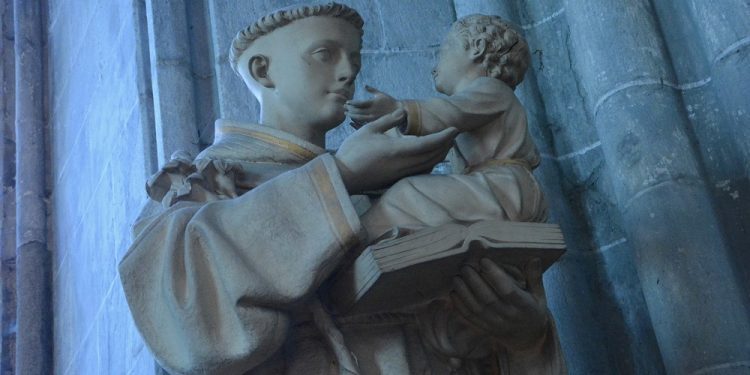
Feast Of St. Anthony
Every year, June 13th is celebrated in Ceuta, Spain as San Antonio. Also known as Romeria de San Antonio (The Day of Saint Anthony) or as the Feast of Saint Anthony, this day commemorates Saint Anthony’s death on this date in 1231. In the autonomous community of Ceuta, this day is a public holiday — which means that government offices, schools, and most businesses are closed for the day or operate on a holiday schedule.
It’s a day for people to attend church services and parades that feature the iconography of this saint. It’s also a day when communal meals are held in this city to celebrate Saint Anthony’s good works.
The History Of San Antonio In Ceuta, Spain
Anthony of Padua was born Fernando Martins de Bulhões in Lisbon, Portugal, on August 15th, 1195. He was born into a wealthy noble family who enrolled him at a local cathedral school. At the age of 15, he entered the Augustinian community of Canons Regular of the Order of the Holy Cross at the Abbey of Saint Vincent in 1210.
He attended the school for two years but asked to be transferred to the Monastery of the Holy Cross in Coimbra to avoid being distracted by frequent visits from members of his family. While there, he immersed himself in monastic life — studying Latin and theology.
He became ordained a priest at the age of 19 and was placed in charge of hospitality for the abbey, but he didn’t stay there very long. Inspired by the example of the five Franciscans who had been beheaded in Morocco on account of their faith, Fernando asked church authorities for permission to leave the Canons Regular and join the new Franciscan order that had established a hermitage outside of Coimbra.
He was accepted into the friars and joined the hermitage located in Olivais. Once there, he adopted the name Anthony and has been known by that name ever since. Over the course of his life, Anthony worked to alleviate the suffering of the poor and those who had been marginalized by society.
He was known not only for helping to feed the poor but also for being able to perform miracles — the most notable being healing the sick. He is also well known for his impressive ability to preach the Gospel to people, as well as his ability to convert non-believers to Christianity.
In 1231, Anthony became sick with ergotism and traveled to the retreat at Camposampiero for a respite. On his way back to Padua, he died on June 13th, 1231, at the Poor Clare monastery located at Arcella. He was only 35 years old. On May 30th, 1232, Pope Gregory IX canonized Anthony.
Today, he is especially revered as the patron saint for recovering lost items, the poor and oppressed, pregnant women, Brazil, and Portugal. Of course, he is also recognized as the patron saint of Ceuta, Spain.
Observing Saint Antonio in Ceuta, Spain
This holiday is celebrated in both the Spanish autonomous city of Ceuta and the coastal capital city of Portugal, Lisbon. In both cities, this day is celebrated with special church services and a parade.
During the parade, a statue of Saint Anthony is carried through the streets. In Ceuta, there is also a communal meal that is used to feed the poor. On social media, the hashtag #RomeriaDeSanAntonio can be used to spread the word about this holiday.








